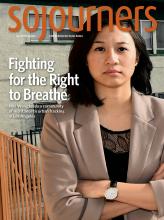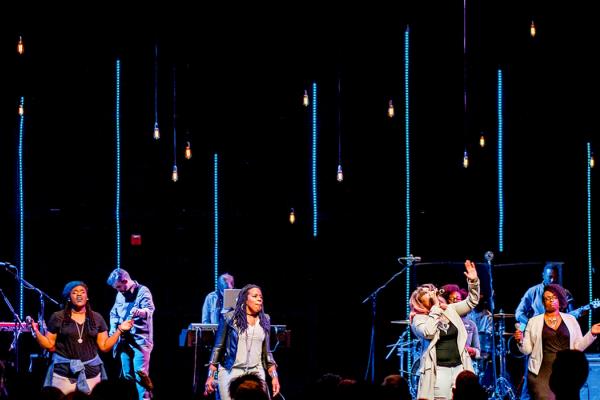ON A TUESDAY EVENING in February, the band called Urban Doxology rehearses for an upcoming performance in Richmond, Va. They jump from song to song without sheet music or a printed set list.
“We who believe in freedom cannot rest,” they sing. “We who believe in freedom cannot rest until it comes.”
The group’s founder, David Bailey, watches. Dressed in a pink button-down shirt and a brown fedora, Bailey moves about the rehearsal space adjusting sound levels and giving occasional feedback.
Ten years ago, Bailey was leading music at a church in the suburbs when he and his wife felt called to join a budding multiethnic, economically diverse worshiping community in the Church Hill neighborhood of Richmond’s East End, where Patrick Henry gave his famous “Give me liberty or give me death” speech in 1775.
Over time, the community grew into a church, East End Fellowship. It found a home in the Robinson Theater, a brightly colored community arts center named after Bill “Bojangles” Robinson, a Richmond native and tap dancer.
Committed to the work of reconciliation, Bailey began leading cultural competency trainings less than four miles from Monument Avenue, a divided street peppered with statues of confederate leaders, including Robert E. Lee, Stonewall Jackson, and Jefferson Davis. Grounded in theology and history, the training provided members with a shared knowledge and language to talk about race. However, Bailey sensed it wasn’t enough.
He noticed the lack of leadership development for people of color going into vocational ministry. He had also grown wary of the available worship music repertoire. “It was like you either had old-school gospel or we had retuned hymns,” he said. East End Fellowship needed more leaders and new songs, ones that better reflected its growing multicultural congregation.
Bailey devised a single solution for the two challenges: a summer internship program dubbed the Urban Doxology Songwriting Internship. “We started the internship so we could develop the kind of leaders we wanted to see as people of color,” Bailey said. “But also so we could create the kind of culture and language for worship that shapes the imagination and deals with the pastoral concerns of the people in the community.”
In 2011, East End Fellowship welcomed its first class of diverse young musicians to Church Hill.
Read the Full Article

